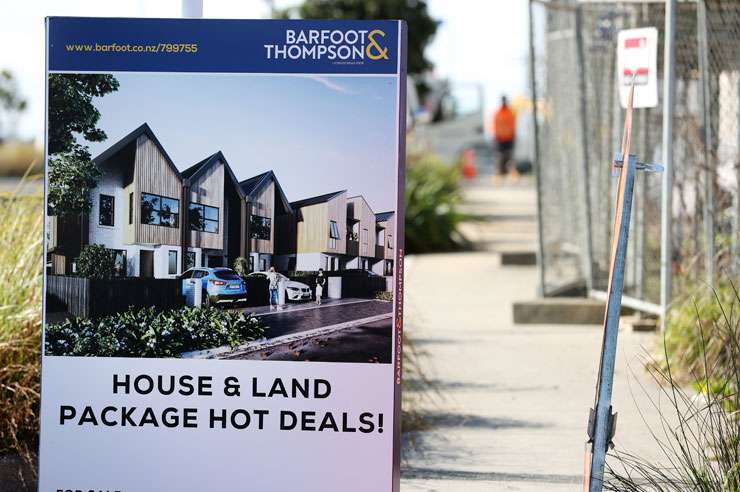It’s a seller’s market out there. Kiwis holding out buying until they get the upper hand may be waiting a long time.
Figures from property data company CoreLogic shows that the scales are tipped heavily in favour of sellers in Auckland and in many other parts of the country, with demand outstripping supply.
CoreLogic’s head of research Nick Goodall highlighted the extremes in the housing market right now: Auckland had only 2.8 weeks of stock on the market, at the time of talking, while the figure for Waimate, in Canterbury, was 23.2 weeks’ worth of stock.
“In Auckland you have 2000 properties on the market, and 9000 sales in the last three months [while] in Waimate you have 50 properties on the market in the last three months and only 28 sales,” he said.
Start your property search
The total number of Auckland listings for October was 41% down on the same time last year and 14% down compared to last month. “It’s very much still a sellers’ market,” Goodall said.
Auckland had the biggest imbalance in favour of sellers at 2.8 weeks to sell. The other main centres ranged from 3.5 weeks to sell in Upper Hutt to 7.5 weeks in Dunedin. All main centres were between 2.8 and 7.5 weeks to sell, Goodall said, explaining that the balance was only starting to tip to buyers in some of the smaller areas.
However, there is more than one way to measure whether we’re in a buyer’s or seller’s market. Independent economist Tony Alexander surveys real estate agents around the country each month and asks whether their markets favour sellers or buyers.

CoreLogic head of research Nick Goodall said the imbalance between buyers and sellers was most pronounced in Auckland. Photo / Supplied
One of the questions he asks is: “In your area which group appears more motivated to transact?” The respondents can choose: “buyers”, “sellers”, or “equal/no view”.
In Alexander’s most recent survey, in September, a net 55% of agents in Auckland believed sellers were more motivated to transact. Across the country that number ranged from a net 83% in Northland down to a net 33% in both Hawke’s Bay and Wellington.
For the rest of the regions, the net percentage of agents reporting motivated sellers was: Bay of Plenty (78%); Nelson/Tasman (76%); Canterbury (65%); Otago excluding Queenstown Lakes (64%); Waikato (63%); and Manawatū (38%). Even the lowest of these regions were still well above the balance point of zero, Alexander said, adding that responses in Taranaki and Queenstown Lakes were insufficient for statistical validity.
Alexander began his survey in April 2020, during lockdown. At that point a net 27% of agents believed it was a sellers’ market. Any number above zero indicates a sellers’ market and doesn’t bode well for anyone buying a home. The higher the number the stronger the sellers’ market. Negative numbers equal a buyers’ market.
Alexander said that the figures escalated throughout 2020 as the market heated up. In December 2020/February 2021 when New Zealand’s property market was at its most frenzied, the figures were net 77% and net 73%.

Economist Tony Alexander says it would take a recession for the market to tilt in favour of buyers. Photo / Fiona Goodall
The property market remained weighted in favour of sellers even after the Government’s housing package in March, which imposed tax changes on property investors.
“What’s driving the imbalance is that buyers hear about nothing but shortages, so they are eager to buy,” alexander said.
“Buyers have record low borrowing costs, and they can't spend overseas. So, the buyers have been very eager to get a house, whereas the sellers feel ‘time is on my side’. And so, the buyers are more motivated to get a deal over the line than the sellers.”
Alexander has seen a lot of FOMO (fear of missing out) from buyers. “They’re probably going to be facing a shortage of listings and they’re probably still going to be facing rising prices over the next few months.”
Buying and selling can come with issues. Some sellers, however, have to buy again, which was a double-edged sword, Alexander said.
According to Alexander, little has changed in the housing market that could affect the numbers since the September survey. The official cash rate rise, which affects interest rates, and soaring inflation rates haven’t had much of an effect so far.
It’s going to take more than that to move the goalposts for anyone buying a property, he said. The last two times New Zealand was in a buyer’s market was in 2008/9 as a result of the GFC and then in late 2013, after loan to value ratio (LVR) restrictions were first introduced, spooking some buyers.

A "for sale" sign in front of an Auckland home. Listing volumes have contracted in the city. Photo / Fiona Goodall
“My previous survey of real estate agents with REINZ ended early in 2014. I can see that when asked whether buyers were more motivated to transact than sellers, there were some net negative results late in 2013, meaning it was a buyers’ market back then. Why? House prices were still fairly flat, and buyers felt that time was on their side. Plus, LVRs were introduced for the first time late in 2013. But that LVR impact did not last.”
What could tip New Zealand into a buyers’ market is a recession and interest rates at levels 2.5% higher than they are now. “We’re quite some way away from that,” Alexander said.
Peter Thompson, managing director of Auckland’s largest real estate agency, Barfoot & Thompson, said Auckland was suffering from low listings levels. “At the end of September, we had 2727 properties for sale, which is a 28 percent decrease when compared to same month last year. Stock is selling quickly, with well prepared and determined buyers succeeding at all levels,” Thompson said.
“What happens in the next couple of weeks will determine how the rest of the year plays out.”

















































































